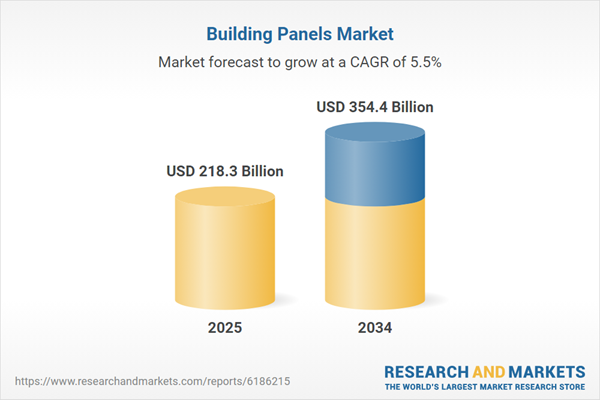The building panels market involves the production and distribution of prefabricated panels used for walls, roofs, and floors in construction. These panels offer advantages such as faster construction, improved energy efficiency, and reduced waste. The market is driven by the growing need for efficient and sustainable building solutions.
Key market segments include structural insulated panels (SIPs), insulated concrete forms (ICFs), and sandwich panels. These panels are used in a variety of applications, from residential construction to commercial and industrial buildings. The market is characterized by ongoing innovation, with manufacturers developing new panel materials and technologies to enhance performance and sustainability.
Geographically, the building panels market has a global presence, with significant adoption in developed and developing regions. North America and Europe lead the market, driven by advanced construction practices and a focus on energy efficiency. Asia-Pacific is experiencing rapid growth, fueled by increasing construction activity and infrastructure development.
Key Insights: Building Panels Market
Sustainable and Eco-Friendly Panels: Increasing demand for panels made from sustainable and recycled materials.High-Performance Panels: Development of high-performance panels with enhanced thermal and structural properties.
Modular Construction: Growing adoption of modular construction techniques using prefabricated panels.
Digital Fabrication: Use of digital fabrication technologies for customized panel production.
Faster Construction: Prefabricated panels enable faster construction and reduced project timelines.
Improved Energy Efficiency: Panels offer improved thermal insulation and reduced energy consumption.
Reduced Construction Waste: Prefabricated panels minimize construction waste and improve material efficiency.
Growing Demand for Sustainable Buildings: Increasing focus on sustainable buildings drives demand for eco-friendly panels.
High Initial Costs: The initial cost of prefabricated panels can be higher compared to traditional construction methods.
Transportation and Logistics: Transporting and handling large panels can be challenging.
Design Flexibility: Prefabricated panels may limit design flexibility compared to traditional construction.
Skilled Labor: Proper installation of prefabricated panels requires skilled labor.
Building Panels Market Segmentation
By Panel Type
- Precast Concrete Panels
- Vacuum Insulated Panels
- Structural Insulated Panels (SIP)
- Wood-Based Panels
- Other Panel Type
By Material Type
- Concrete
- Plastics
- Metal
- Wood
- Silica
By Application
- Commercial Construction
- Residential
- Non-Residential
By End User
- Floors and Roofs
- Walls
- Columns and Beams
- Staircases
Key Companies Analysed
- Panasonic Corporation
- Compagnie de Saint-Gobain SA
- Nippon Steel & Sumitomo Metal Corporation
- CRH plc.
- BMC Inc.
- Evonik Industries AG
- Huntsman International LLC
- Dow Corning Corporation
- Fletcher Building Limited
- Boral Limited
- Armstrong World Industries Inc.
- Kingspan Group PLC
- OCI Company Ltd
- Lg Hausys Ltd
- Mueller Inc
- Owens Corning
- PFB Corporation
- Alubel SpA
- Alumil Aluminium Industry SA
- Alutech United Inc.
- ArcelorMittal
- The Murus Company Inc.
- Rautaruukki Corporation
- The Steel Network Inc.
- U.S. Lumber Group LLC
- USG Corporation
- VELUX Group
- Weyerhaeuser Company
- Xella Group
- Sika AG
- Tata Steel Limited
- The Dow Chemical Company
Building Panels Market Analytics
The report employs rigorous tools, including Porter’s Five Forces, value chain mapping, and scenario-based modeling, to assess supply-demand dynamics. Cross-sector influences from parent, derived, and substitute markets are evaluated to identify risks and opportunities. Trade and pricing analytics provide an up-to-date view of international flows, including leading exporters, importers, and regional price trends.Macroeconomic indicators, policy frameworks such as carbon pricing and energy security strategies, and evolving consumer behavior are considered in forecasting scenarios. Recent deal flows, partnerships, and technology innovations are incorporated to assess their impact on future market performance.
Building Panels Market Competitive Intelligence
The competitive landscape is mapped through proprietary frameworks, profiling leading companies with details on business models, product portfolios, financial performance, and strategic initiatives. Key developments such as mergers & acquisitions, technology collaborations, investment inflows, and regional expansions are analyzed for their competitive impact. The report also identifies emerging players and innovative startups contributing to market disruption.Regional insights highlight the most promising investment destinations, regulatory landscapes, and evolving partnerships across energy and industrial corridors.
Countries Covered
- North America - Building Panels market data and outlook to 2034
- United States
- Canada
- Mexico
- Europe - Building Panels market data and outlook to 2034
- Germany
- United Kingdom
- France
- Italy
- Spain
- BeNeLux
- Russia
- Sweden
- Asia-Pacific - Building Panels market data and outlook to 2034
- China
- Japan
- India
- South Korea
- Australia
- Indonesia
- Malaysia
- Vietnam
- Middle East and Africa - Building Panels market data and outlook to 2034
- Saudi Arabia
- South Africa
- Iran
- UAE
- Egypt
- South and Central America - Building Panels market data and outlook to 2034
- Brazil
- Argentina
- Chile
- Peru
Research Methodology
This study combines primary inputs from industry experts across the Building Panels value chain with secondary data from associations, government publications, trade databases, and company disclosures. Proprietary modeling techniques, including data triangulation, statistical correlation, and scenario planning, are applied to deliver reliable market sizing and forecasting.Key Questions Addressed
- What is the current and forecast market size of the Building Panels industry at global, regional, and country levels?
- Which types, applications, and technologies present the highest growth potential?
- How are supply chains adapting to geopolitical and economic shocks?
- What role do policy frameworks, trade flows, and sustainability targets play in shaping demand?
- Who are the leading players, and how are their strategies evolving in the face of global uncertainty?
- Which regional “hotspots” and customer segments will outpace the market, and what go-to-market and partnership models best support entry and expansion?
- Where are the most investable opportunities - across technology roadmaps, sustainability-linked innovation, and M&A - and what is the best segment to invest over the next 3-5 years?
Your Key Takeaways from the Building Panels Market Report
- Global Building Panels market size and growth projections (CAGR), 2024-2034
- Impact of Russia-Ukraine, Israel-Palestine, and Hamas conflicts on Building Panels trade, costs, and supply chains
- Building Panels market size, share, and outlook across 5 regions and 27 countries, 2023-2034
- Building Panels market size, CAGR, and market share of key products, applications, and end-user verticals, 2023-2034
- Short- and long-term Building Panels market trends, drivers, restraints, and opportunities
- Porter’s Five Forces analysis, technological developments, and Building Panels supply chain analysis
- Building Panels trade analysis, Building Panels market price analysis, and Building Panels supply/demand dynamics
- Profiles of 5 leading companies - overview, key strategies, financials, and products
- Latest Building Panels market news and developments
Additional Support
With the purchase of this report, you will receive:- An updated PDF report and an MS Excel data workbook containing all market tables and figures for easy analysis.
- 7-day post-sale analyst support for clarifications and in-scope supplementary data, ensuring the deliverable aligns precisely with your requirements.
- Complimentary report update to incorporate the latest available data and the impact of recent market developments.
This product will be delivered within 1-3 business days.
Table of Contents
Companies Mentioned
- Panasonic Corporation
- Compagnie de Saint-Gobain SA
- Nippon Steel & Sumitomo Metal Corporation
- CRH PLC
- BMC Inc.
- Evonik Industries AG
- Huntsman International LLC
- Dow Corning Corporation
- Fletcher Building Limited
- Boral Limited
- Armstrong World Industries Inc.
- Kingspan Group PLC
- OCI Company Ltd.
- Lg Hausys Ltd.
- Mueller Inc.
- Owens Corning
- PFB Corporation
- Alubel SpA
- Alumil Aluminium Industry SA
- Alutech United Inc.
- ArcelorMittal
- The Murus Company Inc.
- Rautaruukki Corporation
- The Steel Network Inc.
- U.S. Lumber Group LLC
- USG Corporation
- VELUX Group
- Weyerhaeuser Company
- Xella Group
- Sika AG
- Tata Steel Limited
- The Dow Chemical Company
Table Information
| Report Attribute | Details |
|---|---|
| No. of Pages | 160 |
| Published | October 2025 |
| Forecast Period | 2025 - 2034 |
| Estimated Market Value ( USD | $ 218.3 Billion |
| Forecasted Market Value ( USD | $ 354.4 Billion |
| Compound Annual Growth Rate | 5.5% |
| Regions Covered | Global |
| No. of Companies Mentioned | 32 |









